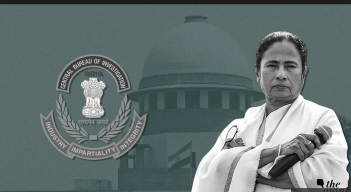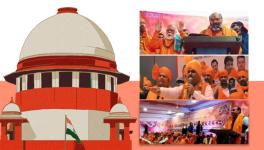CBI vs Mamata Tussle: Both Sides on an Equally Sticky Wicket

Image Coutesy: The Quint
Today, on February 5, 2019, a three-judge bench of the Supreme Court comprising of Chief Justice of India Rajan Gogoi, Justices Deepak Gupta and Sanjiv Khanna directed Kolkata Police Commissioner Rajeev Kumar to appear before the CBI and cooperate with the investigation. The SC has also made it clear that no coercive action including arrest will be made by the CBI.
On the contempt petition filed by the CBI, the Court has issued a notice to Police Commissioner of Kolkata, the Chief Secretary and the DGP of West Bengal. They have been asked to file their reply by February 20, 2019.
The Court has also ordered that a neutral place, Shillong, will be where the CBI would question Rajeev Kumar.
West Bengal CM Mamata Banerjee has hailed today’s directions as a moral victory, while the BJP has claimed the win as its own because Kumar is to be questioned by the CBI in relation to accusations of tampering with the evidence and hampering investigation in the Saradha chit fund scam case.
On Monday, the Supreme Court heard an application and contempt petition by the CBI in relation to the ongoing tussle between the investigating agency and the West Bengal government. Solicitor General Tushar Mehta mentioned the matters before Chief Justice Ranjan Gogoi’s court, but his request for an urgent hearing on the same day was refused. Mehta claimed that the Kolkata Police was hampering the investigation in the Saradha chit fund scam, but the bench refused to believe this plea and demanded evidence for the same.
Also Read: Destroying the CBI as an Institution
The crux of the entire issue, over which Bengal CM Mamata Banerjee has launched a “satyagraha”, is whether the CBI, in going to question (and even possibly arrest) Calcutta Police Commissioner Rajeev Kumar at his Loudon Street official residence in Calcutta, had transgressed constitutional and legal boundaries. Another bone of contention is the Modi government’s decision to deploy central forces to guard the CBI offices, without seeking the permission of the state government. This is to be adjudicated and decided later by the apex court, but it would be worthwhile to look at some incontrovertible facts.
K Ragothaman, the CBI's former chief investigating officer, believes the Bureau is at fault in going to the police commissioner's office without a warrant, as he told Rediff.com in an interview, but the issue is way more complex than that. The main issues is- did the CBI have the legal wherewithal to question Kumar in light of the West Bengal government’s November 2018 decision to withdraw permission to the agency in probing cases in the state (which the Left Front government had granted in 1989)?
Police and public order are ‘State Subjects’ in the Constitution, i.e., state governments run police forces in their respective states and the Centre cannot interfere. The CBI, however, is an agency that was created by the Delhi Special Police Establishment Act 1946, a central law. As a result, it can only operate in any other state if it has the consent of the relevant state government, according to Section 6 of the law.
In the Major E.G.Barsay case of 1961, the Supreme Court upheld Section 6, ruling that no member of the CBI can exercise powers and jurisdiction in any area in a state without the consent of the respective state government. In the same case, the court held that the issue of withdrawal of consent by states can be judicially reviewed. Besides, withdrawal of consent is no bar for a court to order a CBI probe.
The CBI has been investigating the Saradha scam after the Supreme Court transferred the case to it in the Subrata Chattoraj vs. Union of India judgment on May 9, 2014. In that case, the court, led by a bench of former CJI T.S. Thakur, had held without casting any aspersions on the capability of the West Bengal police, that the Saradha case allegations -transcending different state boundaries- required a probe by the central agency.
Withdrawal of Consent is Always with Prospective Effect
The withdrawal of general consent to the CBI to exercise jurisdiction within its territory applies prospectively in Andhra Pradesh and West Bengal, both of which withdrew consent last year. This was clarified by the apex court in the Kazi Lhendup Dorji case in 1994.
The court’s reasoning was that the state government’s withdrawal should not be allowed to stall a pending case, especially one in which the apex court had directed a probe.
The withdrawal of general consent means CBI officers lose police powers under the Criminal Procedure Code in the state concerned and for registering a case. “The case should be allowed to reach its logical conclusion… notwithstanding the withdrawal of consent during pendency of investigation,” the court had held in that case.
Also Read: Andhra Pradesh and West Bengal Governments Revoke ‘General Consent’ from CBI
The Dorji case had dealt with a notification issued by the Sikkim government withdrawing consent to the CBI to probe a corruption case against the then Chief Minister.
As reported in The Quint, it is difficult to see how the West Bengal government (represented by senior advocate and Congress leader Abhishek Manu Singhvi) will be able to argue around this. One possible argument could be that at the time the judgment was passed, the general authorisation for the CBI was still in force, but now that it has been revoked, the CBI has to get permission every time it wants to operate in the state, despite the 2014 directions of the Supreme Court.
However, this argument is unlikely to succeed because of another Supreme Court judgment in 2010 in State of West Bengal vs Committee for Protection of Democratic Rights, West Bengal. In this judgment, a Constitution Bench of the apex court had considered whether it was a violation of the federal structure of the Constitution for a high court or the SC to order an investigation by the CBI without the consent of a state government.
This was rejected on the basis that such an order would be under the constitutional courts’ power of judicial review, which cannot be restricted by any legislation. As a result, the requirement of state governments to consent to a CBI investigation under Section 6 of the DSPE Act does not apply when the Supreme Court or a high court transfers an investigation to the CBI.
Interestingly, current Attorney-General KK Venugopal had represented the State of West Bengal in that case, arguing that Section 6 of the DSPE Act meant a state government’s consent was necessary, even when the higher judiciary ordered the case to be transferred.
Absence of a Search Warrant
In the present case, the CBI team of five officers had gone to question Kumar without a search warrant but armed with a notice under Section 160 of the CrPC.
Chief Minister Mamata Banerjee and a Trinamool Congress leader Derek O’Brien have publicly stated that the CBI officers who turned up at Rajeev Kumar’s house did not have a warrant to do so. Abhishek Manu Singhvi has claimed that the CBI only had a notice under Section 160 of the CrPC with them when they went to Kumar’s house. A notice under this section is a document requiring a person to attend an investigation, issued by an investigatory authority. Kumar reportedly failed to respond to these notices.
There are only limited conditions in which an investigating officer can enter a person’s home without a warrant, for example, if any undue delay would make it impossible to recover the relevant evidence under Section 165 of the CrPC. Unless the CBI can show such grounds, the lack of a warrant may be one of the key grounds on which the West Bengal government will be able to defend the actions of the Calcutta Police.
Also Read: Mamata VS CBI: Whose Fault Is It?
These procedural safeguards would apply even if it is true that Kumar has not been meeting with the CBI when asked. Instead of turning up at his house without a warrant, the CBI could have just approached the courts, obtained an arrest and search warrant, and been in a much better position. Interim Director of the CBI, Nageshwara Rao has argued in a press conference that the CBI had the powers to search and seize under Sections 156(1) and 100 of the CrPC, but these apply only in case of exigencies. In the present case, the CBI has not been able to prove that such an emergency situation exists, though in an India Today report dated February 2, citing anonymous sources, the agency said that Kumar was absconding and was pulling out all stops to derail the probe. Since then, Mamata Banerjee has denied the report and threatened to sue the agency for defaming one of her most able officers.
Calcutta High Court Restrains the CBI
As Senior Advocate Indira Jaising said, the notices to Kumar and other officers are illegal and void because they have been stayed by the Calcutta High Court in December. On December 6, 2018, in an Order, Justice Shivakant Prasad held in CRR 2456 of 2018 that the notices issued under Section 160 were “not legal, valid and sufficient under law.”
“By no stretch of imagination did it mean that the CBI has the power to make the raid at the office of the Kolkata Police Commissioner in relation to the investigation, when the high court is seized of the matter and has passed an order keeping in abeyance the CBI summons to the Kolkata Police in relation to the investigation.”, she had said.
Thus, both sides were on an equally sticky legal wicket, but for now, the Mamata Banerjee government can proudly claim the upper hand.
Read More: Bengal: A Million Red Flags, an Autocratic Move and a Dramatic Dharna
Get the latest reports & analysis with people's perspective on Protests, movements & deep analytical videos, discussions of the current affairs in your Telegram app. Subscribe to NewsClick's Telegram channel & get Real-Time updates on stories, as they get published on our website.























